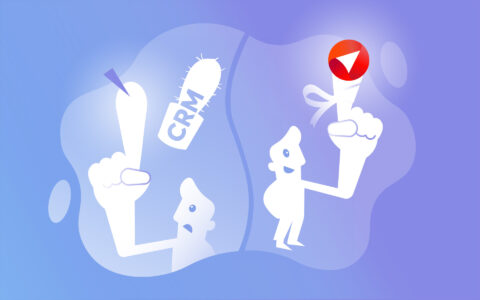Top Features to Look for When Choosing an Automotive Industry-Specific CRM
In the automotive industry, efficiency isn't just an aspiration—it's a necessity. As companies grapple with complex supply chains and fluctuating customer demands, the role of technology becomes undeniable.

Supply chain visibility remains one of the biggest concerns in this industry, with one vehicle being constructed from around 30,000 parts that all need to be sourced and ordered. An organized manufacturing process remains paramount in this regard.
With these complexities in mind, the importance of seamless communication and data management takes center stage. And this is where a tailored Customer Relationship Management (CRM) system comes into play.
But why does an industry as tangible and hardware-focused as automotive need a digital tool like CRM?
It's simple.
The automotive sector, with its intricate networks of dealerships, suppliers, and customers, demands a level of organization that goes beyond manual efforts.
By centralizing data, streamlining tasks, and fortifying customer relationships, a CRM system is no longer a luxury—it's a cornerstone of modern automotive business operations.
Table of Contents:
What Is the Best CRM Software for Car Dealerships?
The Unique Needs of the Automotive Industry
Alleviating Pain Points With the Best CRM Software
The Power of Integrating CRM with Microsoft Outlook
Why eWay-CRM Stands Out for the Automotive Industry
Gearing up for Success with the Right CRM
What Is the Best CRM Software for Car Dealerships?

Consider integrating the functionality of a CRM with a tool as universal as Microsoft Outlook. The prospect of syncing emails, contacts, and schedules directly into the CRM not only promises efficiency but also offers a unified platform that teams are already familiar with.
This blend can significantly amplify productivity and steer the automotive business toward a future of streamlined operations and satisfied customers.
The Unique Needs of the Automotive Industry
The automotive industry stands at the intersection of innovation and tradition. Cutting-edge vehicles are produced and marketed using time-honored business practices. To understand the necessity of a CRM system here, we must first explore the unique organizational challenges that automotive businesses face.
Vast and Intricate Supply Chains
The journey of a vehicle, from conception to a customer's driveway, is not a straightforward one. It involves multiple stages - from design and prototyping to manufacturing and distribution.
Each stage requires coordination with various suppliers. This ensures that parts are delivered on time and meet stringent quality standards. Managing these numerous relationships, tracking inventory, and ensuring timely deliveries necessitate a robust system that offers both overview and detail at a glance.
Dealership Dynamics
Dealerships are the frontline warriors of the automotive world. They are tasked with showcasing the latest models, understanding customer preferences, handling test drives, and facilitating after-sales services. A dealership must maintain a delicate balance between corporate mandates and local customer needs. This requires organized data on sales, customer interactions, and inventory levels.
Personalized Customer Experiences
The modern car buyer often arrive at dealerships armed with research and a list of preferences. For the automotive industry, this means that every interaction, whether it's an email inquiry or a showroom visit, needs to be tailored and relevant. Capturing, analyzing, and leveraging customer data to enhance these interactions can be the difference between a sale and a missed opportunity.
The Digital Shift
With the rise of electric vehicles, tech, and online showrooms, the automotive industry is undergoing a significant digital transformation. As businesses transition towards tech-centric models, there's an increased need for tools that can manage digital inquiries, online bookings, and virtual customer interactions.
Alleviating Pain Points With the Best CRM Software
Navigating the labyrinthine challenges of the automotive sector requires more than just understanding its complexities – it demands proactive solutions.
A CRM system emerges as a panacea, effectively addressing several pain points:
Centralized Operations Platform
The multifaceted nature of the automotive industry can lead to scattered data and operational silos. A CRM acts as a unifying hub, consolidating dealership data, customer inquiries, inventory details, and more. The ability to view all these metrics from a single platform ensures that teams can make informed decisions quickly.
Enhanced Lead Management
From an interested online inquiry to a potential buyer walking into a showroom, every lead holds value. A CRM system not only tracks these leads but also helps manage test drives, follow-ups, and feedback. This ensures no sales opportunity is overlooked.
Data-Driven Insights
CRMs offer analytical tools, like Power BI, that demonstrate customer behaviors and sales patterns. For automotive businesses, this translates to understanding which models are in demand, which marketing strategies resonate, and how to forecast future trends.
Personalizing the Customer Journey
In an age where personalization is paramount, a CRM system holds the key to enhancing customer relationships. By storing historical data, preferences, and past interactions, businesses can tailor every communication to resonate with individual customers.
Seamless Communication and Collaboration
In the automotive industry, multiple teams – sales, service, and marketing – need to work in tandem. A CRM fosters this seamless collaboration. Integrated communication tools ensure that all departments are aligned, reducing miscommunications and enhancing overall productivity.
The Power of Integrating CRM with Microsoft Outlook

As far as business tools go, Microsoft Outlook is not just an email client; it's a hub for communication, scheduling, and task management. When a CRM designed for the automotive industry integrates seamlessly with Outlook, it supercharges the system with enhanced functionality.
Here's how this synergy benefits the industry:
Familiar User Interface
Change can be daunting, especially when teams need to adapt to a new software interface. By integrating CRM with Outlook, businesses capitalize on the existing familiarity that employees have with Outlook's user interface. This leads to quicker onboarding and a reduced learning curve.
Email Management
Communication with suppliers, dealers, and customers is a daily routine. Integrating CRM with Outlook ensures that all email correspondences are automatically saved on the CRM system. This means no manual entry, reducing the chance of oversight and error. It also ensures easy access to historical communications for future reference.
Synchronized Calendars
From scheduling test drives and maintenance appointments to tracking product launches and marketing campaigns, the automotive industry is a symphony of timetables. The integration ensures that all CRM-based schedules and reminders reflect in Outlook, providing users with a consolidated view and timely notifications.
Enhanced Contact Management
Building and maintaining a database of contacts is pivotal. With the integration, every new contact added in Outlook can be directly synced to the CRM, ensuring that sales and service teams always have access to updated customer, supplier, and dealer information.
Task Automation
Automating routine tasks is a productivity booster. Actions like sending follow-up emails after a showroom visit, alerting service teams of upcoming maintenance appointments, or notifying sales about potential leads can be automated when the CRM is integrated with Outlook.
Improved Collaboration
The seamless flow of information between Outlook and the CRM ensures that teams, whether they are in sales, service, marketing, or logistics, have access to real-time data.
Why eWay-CRM Stands Out for the Automotive Industry

There is a large offering of CRMs, each offering its unique features and benefits. However, eWay-CRM distinguishes itself as a solid option for the automotive industry. Here's why:
Tailored to Outlook
One of eWay-CRM's most compelling features is its seamless integration into the Microsoft Outlook environment. This not only eliminates the steep learning curve associated with new software but ensures that the features and functions are used to their fullest potential.
Flexibility in Pricing
For small to medium-sized automotive businesses, the quest is often for robust functionality without a hefty price tag. eWay-CRM’s model of "Start free, upgrade when you’re ready" presents an appealing proposition. With scalable pricing and a solid free version, it caters to diverse budgetary needs without compromising on essential features.
Versatile Utility
Beyond just contact sharing and email organization, eWay-CRM offers a suite of tools tailored to the diverse needs of the automotive industry. Be it project management, deal tracking in the sales module, or the in-built email marketing tool, eWay-CRM caters to the multifaceted demands of dealerships, suppliers, and automotive businesses.
Personalized Approach
Recognizing that each automotive business has unique requirements, eWay-CRM allows users to harness the CRM in a manner best suited to them. The approach of introducing customers via eWay-CRMs free plan and then providing scalable solutions as businesses grow exemplifies the company's commitment to tailored solutions.
User-Friendly Alternative
While the CRM landscape has several giants like Hubspot or Zoho, eWay-CRM positions itself as a more intuitive and user-friendly option. The emphasis is on ease of use without diluting the rich features that modern businesses demand.
Multi-Platform Availability
With the increase in hybrid and remote work, the ability to work anywhere is not just a luxury – it's a necessity. eWay-CRM recognizes this, offering its services not only on the desktop but also on iOS, Android, and Web platforms. This ensures uninterrupted workflow, irrespective of the device or location.
Gearing up for Success with the Right CRM
Choosing the best CRM software for car dealerships is more than just a business decision. It's about ensuring a seamless customer journey, team collaboration, and driving growth with informed insights. For automotive businesses, this decision can be the difference between being a market follower and a market leader.
And the integration of a CRM with Microsoft Outlook isn't merely a technological feature – it's a strategic choice. It offers businesses the familiar environment of Outlook combined with the advanced functionalities of a CRM, ensuring quick adaptability and maximum utility.
eWay-CRM, with its seamless integration and focus on user experience, emerges as a front-runner for the automotive sector. Its comprehensive suite of tools addresses the unique challenges of this industry, from managing leads to fostering customer relationships.
In conclusion, as the automotive industry navigates the roads of innovation, competition, and customer expectations, having a co-pilot like a comprehensive CRM, especially one as attuned as eWay-CRM, ensures the success of the business journey.
Read more about
5 Reasons Why Outlook is a Great CRM Solution for Small-Medium Businesses.










